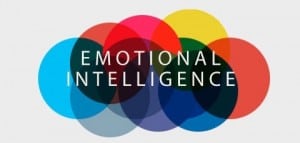Every few years there are training fads and hokum that try to infiltrate the corporate world containing no empirical evidence of success. Examples ranging from Matrix Management to Business Process Reengineering have claimed to provide better productivity in the workplace but rarely take hold.
These fads lack key elements in creating successful leaders, employees, teams and corporate vision. The main reason for implementation burnout or failure stems from the disregard for the personal. These management styles only address surface productivity and design a workflow without consideration for wavering morale, varying emotions, and differing personalities. You know…the human element.
Fortunately there is an emerging practice of embracing the human element through understanding Emotional Intelligence (EQ) within the workplace. This practice doesn’t provide guidelines for organizational matrices or suggest jobs for life but it does allow individuals to learn more about who they really are and why they feel the way they do.
The end result is better productivity, increased creativity, enhanced collaboration, and less stress within the collective environment.
What is Emotional Intelligence?
Emotional Intelligence (EQ) has been defined as “the ability to monitor one’s own and others’ emotions, to discriminate among them, and to use the information to guide one’s thinking and actions” (Salovey & Mayer, 1990).
This intelligence, brought to the mainstream in recent years by Daniel Goleman, provides a psychological perspective to understanding the heart by examining the brain’s architecture. As outlined in his book, Emotional Intelligence, Goleman provides valuable insights into self-awareness and impulse control, persistence, zeal and self-motivation, empathy and social deftness.
EQ goes beyond your mental capacity and personality traits. It is something that can be identified, learned, and utilized within your daily life to enhance your personal and your team’s productivity. In fact, TalentSmart “tested emotional intelligence alongside 33 other important workplace skills, and found that emotional intelligence is the strongest predictor of performance, explaining a full 58% of success in all types of jobs.”
Learning how to identify your feelings allows you to gain deeper insights into your EQ.
How?
Through inward reflection and attentiveness to the self – widely known in spiritual circles for years as the practice of mindfulness. It’s like exercise for the mind.
The practice was first identified circa 29 BCE in a Buddhist Canon where the Buddha described a method of walking “the path of truth” among other things. The ultimate Buddhist’s goal is to reach nibbāna though tiny steps towards enlightenment can be effective on a day to day level.
We’ve seen glimpses of this deeply rooted Eastern practice surface within the West throughout the years. The counterculture movement in the late 60s promoted various Eastern practices though the focus of the movement was geared towards rejecting long held social norms. Nearly a half century later we find mindfulness woven into Western medicine and taught in tandem with religions beyond Buddhism.
Ed Bacon, a rector at All Saints Church and author of 8 Habits of Love, has started integrating the practice of mindfulness in tandem with Christian teachings and retreats. After meeting with the Dali Lama, Bacon offers the following statement on mindfulness: Every profession seems to be discovering the power in developing one’s ability to observe one’s thoughts and feelings with compassion and nonjudgmentalism — without becoming those thoughts and feelings — to develop some distance between our thoughts, feelings, and our self. We have our feelings but we are not our feelings. Mindfulness is the ability to go to the “ocean depths” in one’s mind and look up at the choppy surface of one’s life’s waters with compassion.
However, one doesn’t have to embrace a particular religion or be considered “spiritual” to understand yourself through this journey of the mind. Furthermore, it’s not just believers that have acknowledged and seen positive cognitive rewiring of the brain through mindfulness.
Fadel Zeidan, PhD, an Assistant Professor of Neurobiology and Anatomy at Wake Forest School of Medicine, published a study in Consciousness and Cognition stating minimal mindfulness had positive effects on long-term memory efficiency and sustained attention. Harnessing self control & self awareness enables you to be aware of rising stressors causing decreased personal performance. EQ training coupled with the practice of mindfulness allows you to quickly understand that your body & mind are accepting these influential factors and how to mitigate them. Furthermore, Western medicine has been integrating the practice of mindfulness into the “new generation of psychotherapeutic interventions” (Gordon, 2009).
Mitigating risks in your mind reduces the impact of these stressors on your abilities thus enhancing the true, unhindered mind.





